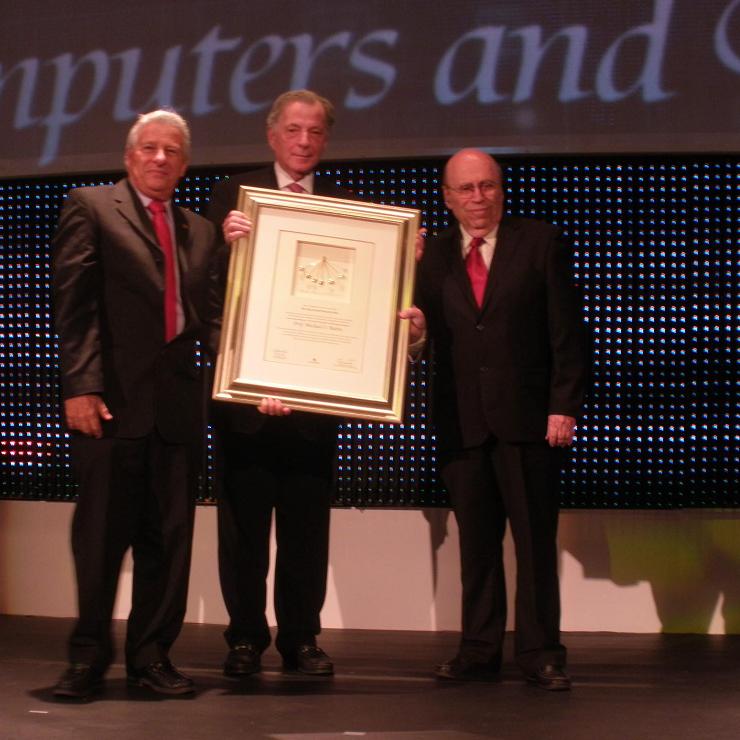Rabin is one of the recipients of the Dan David Prize for 2010 in the dimension of the future which focused on the pioneers of computing and communication. Rabin also spoke on behalf of the inventor of computer communication Prof. Leonard Kleinrock, and the founder of Intel Gordon Moore who was actually absent from the ceremony

"The world of the Internet will leave the virtual space and integrate into the practical world. Most devices will be connected to the Internet and will be connected to a transparent infrastructure like today's electricity. The future of the Internet will be characterized by high mobility, personalization, extensive use of video to video. Access anywhere and surprising services that we hadn't thought of." So said one of the three recipients of the Dan David Prize in the Future Dimension Prof. Michael Rabin from Harvard University, a former Israeli, who developed methods for data encryption and privacy protection as well as methods for processing huge amounts of data, using random functions.
The other two are Prof. Leonard Kleinrock who contributed to the development of communication networks and created the fundamental principles upon which many of the most important aspects of information communication and the Internet are based, and Intel founder Gordon Moore who won an award for "Moore's Law" that guides the semiconductor industry and for being among the founders of Intel, a pioneer the micro processors. Moore was absent from the ceremony, but he appeared in a video in which he told about the background to the chip revolution.
In his speech on behalf of the three winners, Rabin said: "I am happy to respond on behalf of the winners of the Dan David Prize in the future dimension of computers and communications. I am honored to win. Churchill said 60 years ago that the next century will be the century of knowledge. Indeed, in the 21st century, the treasurer of the nations, the wealth of society and the well-being of the people and the planet will depend on scientific knowledge much more than on natural resources such as oil and gas."
"Any progress will require a combination of science and technology. We can expand Churchill's characterizations and say that the next century will be a century of knowledge, computing, communication and information. Gordon Moore is the father of generations of processors found in every computer today. They provide the computing power that enables current and future applications of computing and communication. An important tool in the advancement of technology are the efficient algorithms. In the three decades the use of randomness created a good solution to complicated problems. Solving complex problems such as cancer and Alzheimer's depends on enormous computing power and efficient algorithms. We have seen the growth of the vast databases and search engines that have enabled an unprecedented breakthrough. In the future, it will be possible to upload the entire medical history of a patient to a database and provide better treatment. Aggregate analysis of databases will enable statistical studies that will enable us to know about the development of diseases and the effectiveness of drugs. However, there is a problem of privacy. Modern cryptography tools will allow maintaining privacy in this era."
"My friend Kleinrock says that the culture of the Internet was born on several principles, the first of which is openness and decentralization. The secret of the power of the Internet lies in the fact that everyone can contribute their creative ideas and knowledge and allow others to use them interactively through the Internet. Everyone has their own unique voice - the Internet is a tool that promotes democracy. Everyone's way of creating a community of interests are some of the factors for strengthening democracy in the 21st century."
"I estimate that the Internet will be a transparent infrastructure that serves as a global neural network that connects people and processes across the entire planet." Prof. Rabin concluded.

4 תגובות
The internet is not only good, the internet also disconnects from reality, distracts and addicts, wastes time, it allows you to read only on sites that present your opinion and this does not contribute to pluralism, openness or democracy.
The fact that there is a lot of good on the Internet does not mean that there is no danger and damage to the individual and society.
A one-dimensional view of the internet and more by academics is a dangerous thing.
For Prof, for Epidemiology:
I think he meant that in the future things will not only be possible but will also be done...
This is a higher level of surveillance, such as a biological scanner in the bathroom that checks basic data such as body temperature and urine test... not something that currently exists...
"In the future, it will be possible to upload the entire medical history of a patient to a database and provide better treatment. Aggregate analysis of databases will enable statistical studies that will enable us to know about the development of diseases and the effectiveness of drugs?"
odd! Increasingly this has been happening for 40 years - what about in the future?